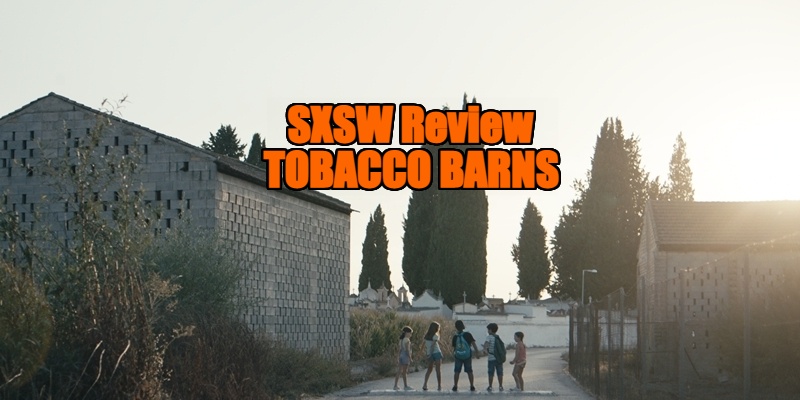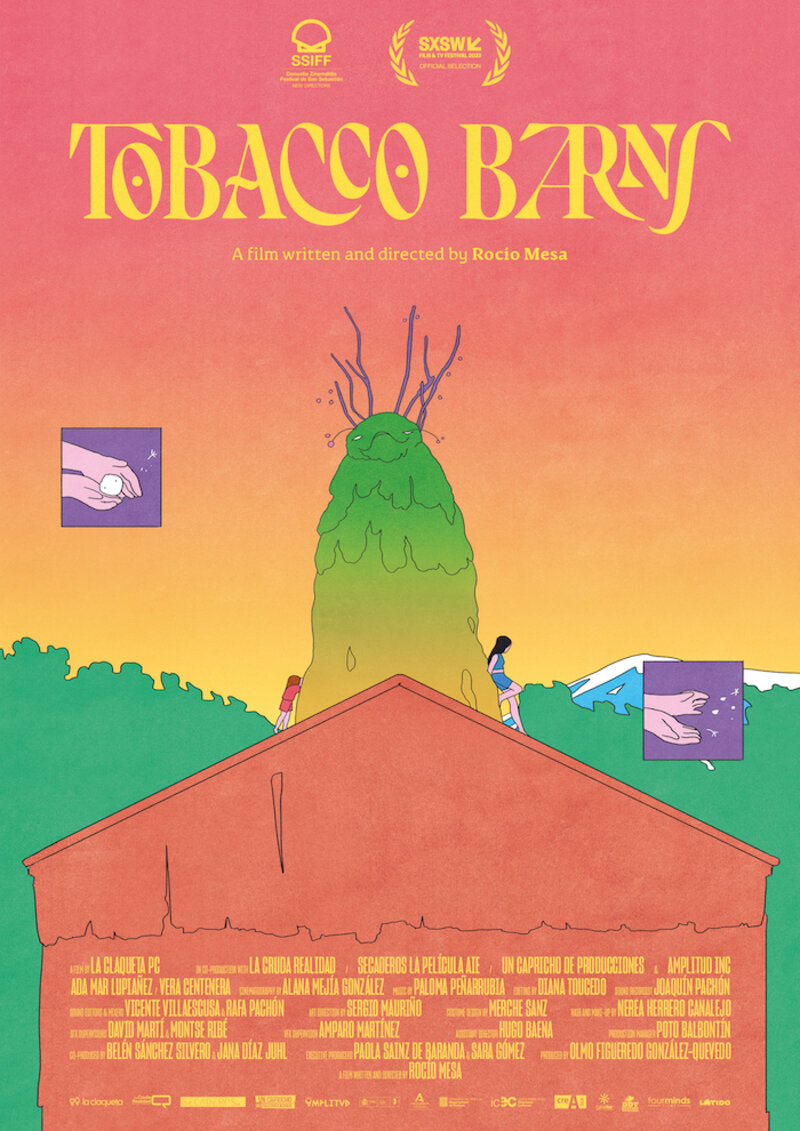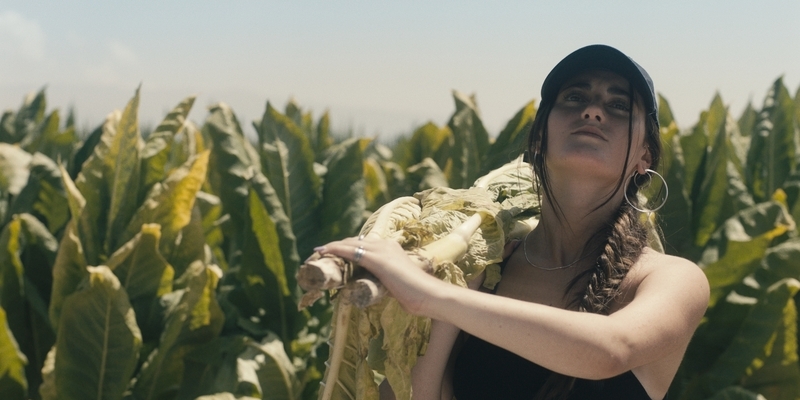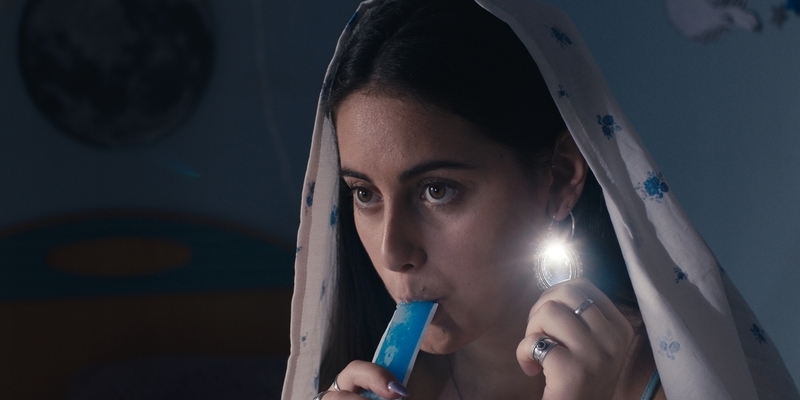
Review by
Eric Hillis
Directed by: Rocío Mesa
Starring: Ada Mar, Vera Centenera, Tamara Arias

The subject of the modern world's encroachment on rural Spain has been
tackled by several Spanish filmmakers recently. Joining the likes of
Jonathan Cenzual Burley (El Pastor), Carla Simón (Alcarras) and Rodrigo Sorogoyen (The Beasts) is writer-director Rocío Mesa, an American-based filmmaker who
draws on her childhood in Southern Spain's Granada region for her
feature debut, the charming Tobacco Barns.
At the foot of the Sierra Nevada mountain range lies the film's
setting, a tranquil village where the locals have long made their living
from farming tobacco. It's an area that's gradually disappearing as land
developers buy up the farms and fill up the land with tracts of homes.
Over the course of a summer - one that is troublingly arid with one
character noting the lack of frosted tips on the distant mountains –
four generations gather. There's seven-year-old Vera (Vera Centenera), spending the summer with her mother (Tamara Arias) and her
grandparents. Across the village we find teenager Nieves (Ada Mar), who works on her parents' tobacco farm all day and parties with her
boyfriend and her boisterous friends all night.

With these four generations, all played in convincing fashion by
non-professional actors plucked from the area, Mesa suggests life in
this part of the world goes through four stages. Stage One is Wonder, as
expressed by the young Vera, for whom every morning presents a new
adventure. She finds nothing but enchantment in the area, and is
fascinated by the giant structures that give the film its title. Stage
Two is Anxiety, represented by Nieves, who longs for nothing more than
to get away from her stifling home town. Stage Three is Resentment, seen
in the form of Nieve's father, who embodies everything Nieves fears she
might become, a middle-aged man depressed by the cards life has dealt
him. The final stage is Acceptance, a state achieved by Vera's
grandparents, who probably went through the previous two stages for much
of their adult life but have now come to view life through the same lens
as Vera. For them, every day is another gift.
What separates Vera and the other children of her age from the adults
is that they can see a "monster." Created by DDT, the Spanish FX company
whose work can be seen in the likes of Pan's Labyrinth and
A Monster Calls, two films with similar coming-of-age themes, the creature is a Jim
Henson-esque creation that resembles a giant bird with huge tobacco
leaves for feathers and branches for eyebrows. Rather than fleeing in
terror as an adult might, the kids see only wonder in this creature, and
follow it as it wheezes its way through the local woods, unseen by
adults who have become too distracted by the weight of reality.

Mesa seems to suggest that life beats our childhood sense of wonder out
of us, that it's only late in life that we once again begin to
appreciate the simple joy of being alive. There's a very affecting scene
in which Vera's grandparents take a seat outside and attempt to complete
a magazine crossword. It's an everyday moment for people like this, and
yet its simplicity is overwhelmingly romantic. How many couples will
make it to that age and still find joy in each other's company in such a
manner? The two amateur actors, whose names I'm unfortunately unable to
find anywhere online, play the scene beautifully, with a natural ease
that suggests they may have played a role in improvising its creation. I
wouldn't be surprised to learn they're a real life couple.
The bulk of the film concerns Nieves, wonderfully played by Mar in what
might be the most striking performance by a non-professional teenage
actress since Katie Jarvis in Andrea Arnold's Fish Tank. There's something of the young Penelope Cruz about Mar, not just in
her movie star looks but in how she's able to effortlessly convey a
simultaneous mix of feistiness and vulnerability. For a first-timer,
Mar's work here is remarkable, especially in two key scenes, one
involving her reaction to an admission from her mother, the other a
moment where she confesses her discontent to her dismayed boyfriend. If
Mar doesn't go on to become a professional performer it will be cinema's
loss.

As a director, Mesa makes an equally impressive debut. Like her leading
lady, she's able to express two different states at once, portraying her
childhood home as both a place of wonder and stifling confinement. As
the narrative progresses the tobacco barns of the title morph from
sanctuaries to prisons and back again. With its lack of opportunities
for anyone who doesn't want to commit their life to working the land,
you can see why Mesa left the region. And yet the way she captures its
beauty suggests that it may well call her back at some point in the
future, if it hasn't been bulldozed into oblivion by then.


